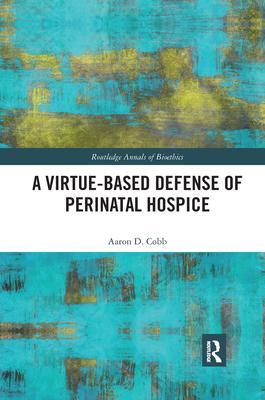Perinatal hospice is a novel form of care for an unborn child who has been diagnosed with a significantly life-limiting condition. In this book, Aaron D. Cobb develops a virtue-based defense of the value of perinatal hospice. He characterizes its promotion and provision as a common project of individuals, local communities, and institutions working together to provide exemplary care. Engaging with important themes from the work of Alasdair MacIntyre and Robert Adams, he shows how perinatal hospice manifests virtues crucial to meeting the needs of families in these difficult circumstances. As a work of applied virtue ethics, this book has important normative, social, and political implications for the creation and development of structured programs of care. It grounds the view that communities ought (i) to devote resources to ensure that these programs are widely available and (ii) to develop social structures that promote awareness of and accessibility to these forms of care. A Virtue-Based Defense of Perinatal Hospice will be of interest to philosophers working in bioethics and applied virtue ethics, as well as scholars in the fields of neonatology, nursing, palliative and hospice care, and counseling who are interested in the study of perinatal hospice.

Perinatal hospice is a novel form of care for an unborn child who has been diagnosed with a significantly life-limiting condition. In this book, Aaron D. Cobb develops a virtue-based defense of the value of perinatal hospice. He characterizes its promotion and provision as a common project of individuals, local communities, and institutions working together to provide exemplary care. Engaging with important themes from the work of Alasdair MacIntyre and Robert Adams, he shows how perinatal hospice manifests virtues crucial to meeting the needs of families in these difficult circumstances. As a work of applied virtue ethics, this book has important normative, social, and political implications for the creation and development of structured programs of care. It grounds the view that communities ought (i) to devote resources to ensure that these programs are widely available and (ii) to develop social structures that promote awareness of and accessibility to these forms of care. A Virtue-Based Defense of Perinatal Hospice will be of interest to philosophers working in bioethics and applied virtue ethics, as well as scholars in the fields of neonatology, nursing, palliative and hospice care, and counseling who are interested in the study of perinatal hospice.